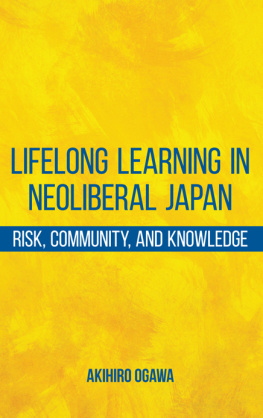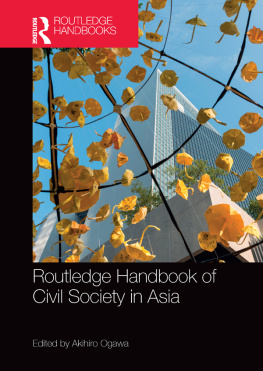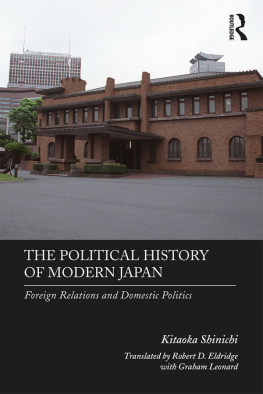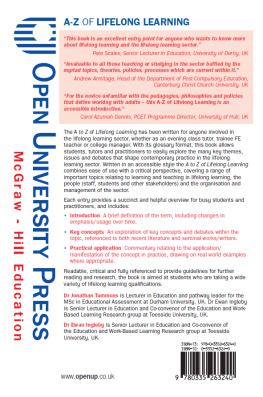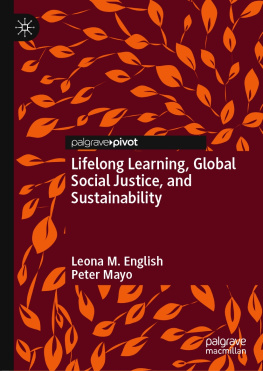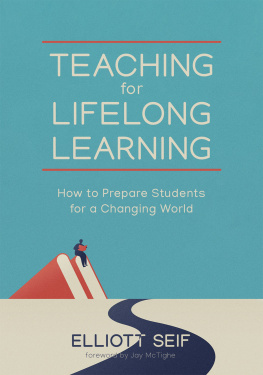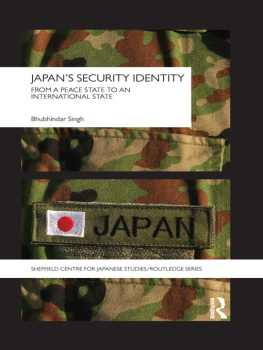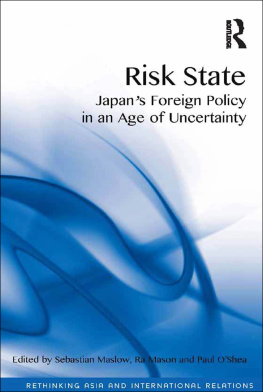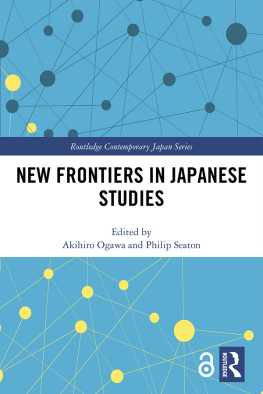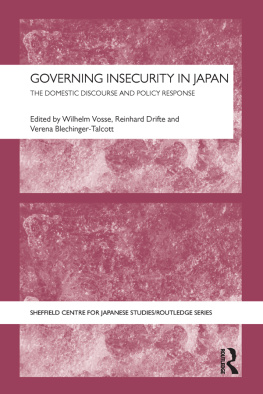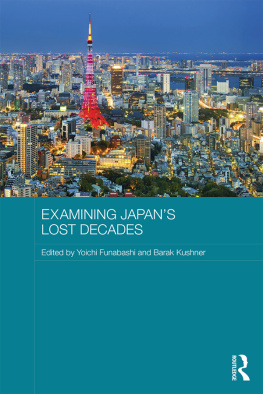LIFELONG LEARNING IN NEOLIBERAL JAPAN
LIFELONG LEARNING IN NEOLIBERAL JAPAN
RISK, COMMUNITY, AND KNOWLEDGE
AKIHIRO OGAWA
Cover image from fotolia.com
Published by State University of New York Press, Albany
2015 State University of New York
All rights reserved
Printed in the United States of America
No part of this book may be used or reproduced in any manner whatsoever without written permission. No part of this book may be stored in a retrieval system or transmitted in any form or by any means including electronic, electrostatic, magnetic tape, mechanical, photocopying, recording, or otherwise without the prior permission in writing of the publisher.
For information, contact State University of New York Press, Albany, NY
www.sunypress.edu
Production, Diane Ganeles
Marketing, Fran Keneston
Library of Congress Cataloging-in-Publication Data
Ogawa, Akihiro.
Lifelong learning in neoliberal Japan : risk, community, and knowledge / Akihiro Ogawa.
pages cm
Includes bibliographical references and index.
ISBN 978-1-4384-5787-1 (hardcover : alk. paper)
ISBN 978-1-4384-5788-8 (e-book)
1. Continuing educationJapan. 2. NeoliberalismJapan. I. Title.
LC5257.J3O345 2015
10 9 8 7 6 5 4 3 2 1
To my parents, Ogawa Sachio and Masako,
who gave me life and have always nurtured my learning
and intellectual curiosity
Contents
Chapter 1
Introduction
Chapter 2
Japans Lifelong Learning: History, Policies, and Practices
Chapter 3
Risk Management by a Neoliberal State
Chapter 4
The New Public Commons
Chapter 5
The Japanese Community School
Chapter 6
Becoming a Social Entrepreneur
Chapter 7
New Knowledge for Youth
Afterword
Kizuna
Illustrations
Figure
Photographs
Preface
The idea for this book originally came from a conference paper that I presented in Daejeon, South Korea, in 2009. The material for the paper was based on Japans lifelong learning, and I was looking for some theoretical orientations to support my argument. I owe a lot to Glenn Hook, who was on the same panel as a colleague of the European Japan Advanced Research Network (EJARN) and recommended that I look at the risk scholarship. I am also grateful to Marie Sderberg, organizer of EJARN and colleague in Stockholm, who gave insightful feedback on my work.
This project was based on my research network in the field of lifelong learning over a decade. I was often inspired by my research collaboratorsTakemoto Hirokazu, Shimada Yasuko, Ito Misao, Sahara Shigemoto, Takabayashi Mari, Shirai Toru, Okubo Kuniko, Tanaka Hiroko, Yamashita Haruko, Suzuki Shosei, and Sawauchi Takashi. Kondo Shinji, editor of Shakai kyiku , helped me to come into contact with the newest developments on Japans lifelong learning policies and practices across the country.
I had the good fortune to add further contacts in Aomori to my research network: Kitaoka Seiko, Seino Mayumi, Yatsuyanagi Kakuya, Misawa Akira, Osanai Makoto, Saito Masami, Shikanai Aoi, Narita Harumi and his staff members of Aun, Fushimi Hideto, Kudo Midori, and Ishioka Yuriko. I also benefited from engaging conversations with Sato Sanzo, Lee Young-Jun, Iwata Ittetsu, Kotaya Fumihiko, and Anthony Rausch at Hirosaki University.
Patricia Nelson, Verena Blechinger-Talcott, Sherry Martin, Mitsui Hideko, Roger Goodman, Kariya Takehiko, Ian Neary, Ronald Dore, Joy Hendry, Mitch Sedgwick, Peter Wynn Kirby, Susan Wright, Pia Cort, Katrina Moore, Annamari Konttinen, and Sidsel Hansson offered comments and suggestions on earlier versions of the chapters and research presentations. Special thanks go to Jeff Kingston, who was often the first reader for the chapters and gave me useful and relevant comments. Kuramasu Nobuko helped me access Japanese primary sources.
For the academic year 20092010, I was on the postdoctoral fellowship in the German Research Foundation (DFG)funded research project 1613 Risk and East Asia at the University of Duisburg-Essen Institute of East Asian Studies. During my stay in Duisburg, I had a great chance to become familiar with the theoretical literature on risk. Many thanks go to Karen Shire, speaker of the research project, and Kawai Norifumi, an important colleague of mine. In the following academic year, 20102011, my fieldwork was supported by a grant from the Abe Fellowship Program administered by the Social Science Research Council and the American Council of Learned Societies in cooperation with and with funds provided by the Japan Foundation Center for Global Partnership. During my fieldwork, I was affiliated with the National Graduate Institute for Policy Studies (GRIPS) in Tokyo, under the sponsorship of Konno Masahiro and Okamoto Kaoru, and the University of Aarhus Danish School of Education in Copenhagen, under the sponsorship of Susan Wright. I am grateful to all of them.
l am indebted to Theodore Bestor and Davydd Greenwoodtwo great anthropologists who have inspired me since my graduate days at Cornell.
I thank Nancy Ellegate, senior editor of SUNY Press, for her continuing support.
An earlier version of chapter 3 appeared as Risk Management by a Neoliberal State: Construction of New Knowledge through Lifelong Learning in Japan, Discourse: Studies in the Cultural Politics of Education 34 (2013, 132144). Part of chapter 1 appeared as Japans New Lifelong Learning Policy: Exploring Lessons from the European Knowledge Economy, International Journal of Lifelong Education 28 (2009), 60114. Part of chapter 4 appeared as The Construction of Citizenship through Volunteering: The Case of Lifelong Learning, in Japans Politics and Economy: Perspectives on Change (London, New York: Routledge, 2009), edited by Patricia A. Nelson and Marie Sderberg. Some of my reflections on the research for this book appeared in Lifelong Learning in Tokyo: A Satisfying Engagement with Action Research in Japan, Anthropology in Action : Journal of Applied Anthropology in Policy and Practice 20 (2013), 4657.
The photographs in chapter 4 were provided by Yamashita Haruko ). Unless otherwise noted, the remaining photographs are mine.
Because of the confidential nature of the material upon which this book draws, no identifying individual names for data sources are provided. Except where otherwise indicated, all quotations are taken from my field notes, and all translations are mine. Furthermore, Japanese individuals names are written with the surname first. Conversions from Japanese yen to U.S. dollars are made at a constant rate of 102 yen to the dollar.
Many thanks to Deborah and Hannah for their active involvement in numerous brainstorming sessions over breakfast and dinner tables when I struggled to organize my ideas for this book. Their comments were very helpful.
Introduction
Why Lifelong Learning Now?
Lifelong learning has become a primary focus in Japans education policy making. Its heightened importance became evident in December 2006, when the Japanese term shgai gakush (which directly translates into English as lifelong learning) was added to Japans educational charter, the Fundamental Law of Education ( kyiku kihon h ). This was the first revision made since the charters enactment in 1947. Yet, we must ask: Why is the focus now on lifelong learning? This is the primary research question that this book attempts to answer.

